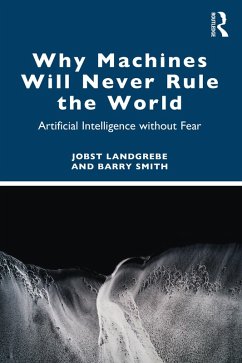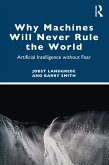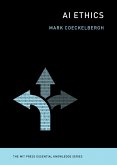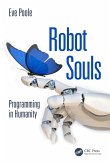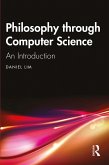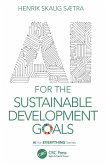The book's core argument is that an artificial intelligence that could equal or exceed human intelligence - sometimes called artificial general intelligence (AGI) - is for mathematical reasons impossible. It offers two specific reasons for this claim.
Dieser Download kann aus rechtlichen Gründen nur mit Rechnungsadresse in A, B, BG, CY, CZ, D, DK, EW, E, FIN, F, GR, HR, H, IRL, I, LT, L, LR, M, NL, PL, P, R, S, SLO, SK ausgeliefert werden.
"It's a highly impressive piece of work that makes a new and vital contribution to the literature on AI and AGI. The rigor and depth with which the authors make their case is compelling, and the range of disciplinary and scientific knowledge they draw upon is particularly remarkable and truly novel."
Shannon Vallor, Baillie Gifford Chair, Edinburgh Futures Institute, The University of Edinburgh
"The alluring nightmare in which machines take over running the planet and humans are reduced to drudges is not just far off or improbable: the authors argue that it is mathematically impossible. While drawing on a remarkable array of disciplines for their evidence, the argument of Landgrebe and Smith is in essence simple. Compulsory reading for those who fear the worst, but also for those inadvertently trying to bring it about."
Peter M. Simons, Professor, Department of Philosophy, Trinity College Dublin
"Just one year ago, Elon Musk claimed that AI will overtake humans "in less than five years". Not so, say Landgrebe and Smith, who argue forcefully that it is mathematically impossible for machines to emulate the human mind. This is a timely, important, and thought-provoking contribution to the contemporary debate about AI's consequences for the future of humanity."
Berit Brogaard, Professor, Department of Philosophy University of Miami
"This book challenges much linguistically underinformed AI optimism, documenting many foundational aspects of language that are seemingly intractable to computation, including its capacity for vagueness, its interrelation
with context, and its vast underpinning of implicit assumptions about physical, interpersonal, and societal phenomena."
Len Talmy, Professor, Center for Cognitive Science University at Buffalo
"Landgrebe and Smith orchestrate a battery of arguments from philosophy, biology, computer science, linguistics, mathematics and physics in order to argue effectively and with great brio that AI has been oversold. The result is a model of how to bring together results from many different fields and argue for an important thesis."
Kevin Mulligan, Professor, Department of Philosophy, University of Geneva
"Why, after 50 years, are AI systems so bad at communicating with human beings? This book provides an entirely original answer to this question-but it can be summed up in just one short phrase: there is too much haphazardness in our language use. AI works by identifying patterns, for instance in dialogue, and then applying those same atterns to new dialogue. But every dialogue is different. The old patterns never work. AI must fail. If you care, read the book.'
Ernie Lepore, Distinguished Professor, Department of Philosophy, Rutgers University
Shannon Vallor, Baillie Gifford Chair, Edinburgh Futures Institute, The University of Edinburgh
"The alluring nightmare in which machines take over running the planet and humans are reduced to drudges is not just far off or improbable: the authors argue that it is mathematically impossible. While drawing on a remarkable array of disciplines for their evidence, the argument of Landgrebe and Smith is in essence simple. Compulsory reading for those who fear the worst, but also for those inadvertently trying to bring it about."
Peter M. Simons, Professor, Department of Philosophy, Trinity College Dublin
"Just one year ago, Elon Musk claimed that AI will overtake humans "in less than five years". Not so, say Landgrebe and Smith, who argue forcefully that it is mathematically impossible for machines to emulate the human mind. This is a timely, important, and thought-provoking contribution to the contemporary debate about AI's consequences for the future of humanity."
Berit Brogaard, Professor, Department of Philosophy University of Miami
"This book challenges much linguistically underinformed AI optimism, documenting many foundational aspects of language that are seemingly intractable to computation, including its capacity for vagueness, its interrelation
with context, and its vast underpinning of implicit assumptions about physical, interpersonal, and societal phenomena."
Len Talmy, Professor, Center for Cognitive Science University at Buffalo
"Landgrebe and Smith orchestrate a battery of arguments from philosophy, biology, computer science, linguistics, mathematics and physics in order to argue effectively and with great brio that AI has been oversold. The result is a model of how to bring together results from many different fields and argue for an important thesis."
Kevin Mulligan, Professor, Department of Philosophy, University of Geneva
"Why, after 50 years, are AI systems so bad at communicating with human beings? This book provides an entirely original answer to this question-but it can be summed up in just one short phrase: there is too much haphazardness in our language use. AI works by identifying patterns, for instance in dialogue, and then applying those same atterns to new dialogue. But every dialogue is different. The old patterns never work. AI must fail. If you care, read the book.'
Ernie Lepore, Distinguished Professor, Department of Philosophy, Rutgers University

